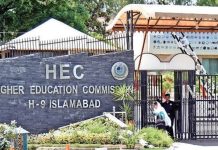The corona pandemic has reinforced several key messages about the way human beings govern their collective affairs today, whether they are they local, national, or global. These range from importance of sustainable development to the need for evidence-based policy formulation and implementation. We are living in an unprecedented era of change where technology is reshaping every aspect of life. The very nature of governance is changing and new human needs and problems are arising. It is pertinent to closely link the academia, industry and the market, without which the possibility of a viable public sector, successful governance and a stable economy becomes next to nothing.
In the developed world, policies are driven by research, transparency and active involvement from stakeholders, resulting in efficient service delivery and national integration. Decision making without evidence, solid data and research leads to policy failures and, hence, poor governance. Developing countries are plagued by disconnect between research and policy formulation. As Dr Vaqar Ahmed underpins in Pakistan’s Agenda of Economic Reforms, our country faces a serious and lingering lack of institutional arrangement within our framework for research-based policy formulation, and post implementation feedback. This gap coupled with poor implementation leads to a breakdown of service delivery with serious repercussions for integration of states and societies.
Literature suggests that policy-makers, practitioners and researchers lack sufficiently productive linkages. This research-policy gap is prevalent due to research and policy side irritants. On the research side, research topics lack relevance to the policy needs, prescriptions are not definitive enough, or feasible. Inadequate funding, expertise, data quality, and dissemination are also significant irritants. On the policy side, policy-makers and civil servants, with little time for long research reports, look for quick fixes and apparently practical solutions. Development priorities, completion time, expenditure control, visibility, reputation and political gains take precedence over in-depth research, technical soundness and long-term implications.
Politicians in developing nations are mostly generalists; they lack technical skills and are often alien to the language and technical jargon used by researchers. However, parliaments and governments in the developed world are well equipped with technical staff that either carries out the necessary research by themselves or in collaboration with research centres and universities. Researchers always map, identify and find solutions to the problems while policy makers implement those solutions.
In a seminar recently organised by health professionals in Peshawar, the panellists shared thoughts on translating research into policies, bridging the gap between theory and practice. Though the studies and examples were mostly from the health sector but by and large they were cross-cutting in nature. Quoting a paper published in Technology Times the participants were apprised that Pakistan had allocated Rs 82 billion to the provincial budgets and Rs 52 billion to the federal budget of 2017-18 exclusively for research and development (R&D). Although the same paper reveals that the economies of our peers are spending much higher amounts than Pakistan, this allocation is still phenomenal for a debt driven economy.
Turkey and Malaysia are far ahead of Pakistan in spending on R&D and they produce a much higher number of researchers in proportion to their population. Even Bangladesh, Iran and other Central Asian economies are adapting similar measures. And while we are definitely no match for US and China but it is revealing that they have spent over USD 450 billion to compete with each other in the R&D department. According to The Economist, British Prime Minister Boris Johnson, pledging to revive the glory of British science, promised to double research funding in four years. In Pakistan, on the contrary, the R&D budget is always underutilised and resultantly an easy casualty for politicians looking to re-appropriate funds.
Exceptions aside, our budgetary allocations are mostly directionless, hasty, discriminatory, arbitrary and without prior planning. They are not inclusive and miss national priorities, including public health problems, illiteracy, out of school children and the high dropout rates in the country. We still struggle with diseases such as polio, while the numbers of hepatitis-C cases have reached alarming new proportions. An estimated eight to ten million citizens are living with active hepatitis-C in Pakistan while another 20 million people have contracted the virus at some point or the other. Despite the numbers being so high, successive governments have ignored this problem, which has led to huge repercussions for the economy and the nation as a whole.
Additionally, a study conducted by the Prime Foundation, financed by the Khyber Pakhtunkhwa (K-P) government, suggested that the vertical transmission of hepatitis-B from mother to new born babies can be prevented by the free provision of hepatitis immunoglobulin (HBIG) vaccine in the province, at a cost of Rs 117 million. EPI programmes provide hepatitis vaccines to babies free of cost but they do not offer HBIG vaccines for the mothers to prevent this transmission. Regardless of the findings and successful implementation models from countries such as Brazil, the K-P government has been dragging its feet for the last three years with no policies coming out based on the research.
In Pakistan, over 22 million children are out of school, while in K-P alone, 73 to 77 per cent of children are forced to leave government schools after completing primary levels because of a dire shortage of high schools, overall low standard of education and poor examination results.
The provincial government will spend Rs 70 billion on the Bus Rapid Transit system, at the cost of the education of out of school children because our leaders are fascinated by big infrastructural projects and are oblivious to the power of education.
By Ali Imran






